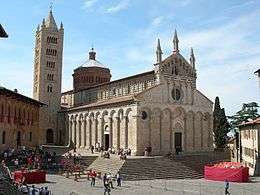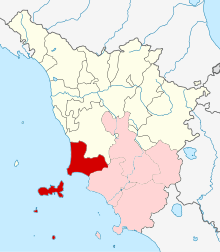Roman Catholic Diocese of Massa Marittima-Piombino
| Diocese of Massa Marittima-Piombino Dioecesis Massana-Plumbinensis | |
|---|---|
 Massa Marittima Cathedral | |
| Location | |
| Country | Italy |
| Ecclesiastical province | Siena-Colle di Val d'Elsa-Montalcino |
| Statistics | |
| Area | 1,200 km2 (460 sq mi) |
| Population - Total - Catholics |
(as of 2004) 127,677 126,000 (98.7%) |
| Parishes | 53 |
| Information | |
| Denomination | Catholic Church |
| Rite | Roman Rite |
| Established | 5th century |
| Cathedral | Basilica Cattedrale di Cerbone Vescovo (Massa Marittima) |
| Co-cathedral | Chiesa Abbaziale di S. Antimo Martire (Piombino) |
| Current leadership | |
| Pope | Francis |
| Bishop | Carlo Ciattini |
| Map | |
 | |
| Website | |
| www.diocesimassamarittima.it | |
The Diocese of Massa Marittima-Piombino (Latin: Dioecesis Massana-Plumbinensis) is a Roman Catholic eccleasistical territory in central Italy, and was known as Diocese of Massa Marittima before 1978. It is a historic church territory in Tuscany, suffragan of the Archdiocese of Siena.[1][2]
The diocese has an area of 1,200 square kilometres, an overall population of 126,931, a Catholic population of 125,000, 60 priests, 4 permanent deacons, and 82 religious, and the present bishop, appointed on 15 December 2010, is Carlo Ciattini.
History
It was first mentioned in the eighth century. It grew at the expense of Populonia, an ancient city of the Etruscans. Populonia was besieged by Sulla, and in Strabo's time was already declining; later it suffered at the hands of Totila, of the Lombards, and in 817 of a Byzantine fleet. After this, the bishops of Populonia abandoned the town, and in the eleventh century, established their residence at Massa.
In 1226 Massa became a commune under the protection of Pisa. In 1307 it made an alliance with Siena, which was the cause of many wars between the two republics.
The first known Bishop of Populonia was Atellus (about 495); another was Saint Cerbonius (546), protector of the city, to whom Saint Gregory refers in his Dialogues. Among the bishops of Massa were Antonio da Massa Marittima (1430), a former minister general of the Franciscans, and legate of Pope Boniface IX; Leonardo Dati (1467), author of poetic satires; Alessandro Petrucci (1601), who embellished the cathedral and the episcopal palace; the Camaldolese Eusebio da Ciani (1719), who governed the diocese for fifty-one years. This see was at first suffragan of Pisa, but since 1458 of Siena.
Ordinararies
Diocese of Massa Marittima
Latin Name: Massanus
Erected: 5th Century
Metropolitan: Archdiocese of Siena
- Pietro Dell'Orto (6 Mar 1439 - 1467 Died)
- ...
- Barthelemy della Rovere, O.F.M. (8 Jan 1472 - 11 Jul 1474 Appointed, Bishop of Ferrara)
- Giovanni Gianderoni, O.S.A. (15 Jul 1475 - 1483 Died)
- Ventura Benassai (6 Oct 1501 - 1511 Died)
- Alfonso Petrucci (1511 - 22 Jun 1517 Resigned)
- Giovanni Gregorio Peroschi (16 Jul 1517 - 8 Aug 1524 Appointed, Bishop of Telese o Cerreto Sannita)
- Francesco Peroschi (29 Jul 1524 - 1529 Resigned)
- Paolo Emilio Cesi (6 Oct 1529 A- 21 Oct 1530 Resigned)
- Girolamo Ghianderoni (21 Oct 1530 - 12 Nov 1538 Appointed, Bishop of Ancona e Numana)
- Alessandro Farnese (Jr.) (15 Nov 1538 - 22 Apr 1547 Appointed, Administrator of Viseu)
- Bernardino Maffei (22 Apr 1547 - 7 Jun 1549 Appointed, Bishop of Caserta)
- Miguel da Silva (20 May 1549 - 5 Jun 1556 Died)
- Francesco Franchini (30 Oct 1556 - 1559 Died)
- Ventura Buralini (13 Mar 1560 - 1570 Died)
- Antonio de Angelis (23 Aug 1570 - 1579 Died)
- Alberto Bolognetti (27 Apr 1579 - 17 May 1585 Died)
- Vincenzo Casali (1 Jul 1585 A- 1587 Resigned)
- Achille Sergardi (28 Sep 1587 - 1601 Died)
- Alessandro Petrucci (22 Apr 1602 - 23 Mar 1615 Appointed, Archbishop of Siena)
- Fabio Piccolomini (30 Mar 1615 - 1629 Died)
- Giovanni Battista Malaspina (17 Sep 1629 - 16 Oct 1655 Died)
- Bandino Accarigi (3 Mar 1656 - Aug 1670 Died)
- Niccolò Della Ciaia (20 Apr 1671 - Aug 1679 Died)
- Paolo Pecci (27 Nov 1679 - Oct 1694 Died)
- Pietro Luigi Malaspina, C.R. (2 May 1695 - Dec 1705 Died)[3]
- Ascanio Silvestri (17 May 1706 - 13 Jun 1714 Appointed, Bishop of Pienza)
- Niccolò Tolomei (21 Jan 1715 - May 1718 Died)
- Eusebio Ciani, O.S.B. (2 Oct 1719 - 2 Feb 1770 Died)
- Pietro Maria Vannucci (12 Dec 1770 - 7 Aug 1793 Died)
- Francesco Toli (22 Sep 1795 - 28 Mar 1803 Appointed, Bishop of Pistoia e Prato)
- Giuseppe Mancini (2 Oct 1818 - 12 Jul 1824 Appointed, Archbishop of Siena)
- Giuseppe II Maria Traversi di Pereta (19 Dec 1825 - 27 Aug 1872 Died)
- Giuseppe Morteo, O.F.M. Cap. (23 Dec 1872 - 21 Nov 1891 Died)
- Giovanni Battista Boracchia (11 Jul 1892 - 24 Apr 1924 Died)
- Giovanni Piccioni (18 Dec 1924 - 1933 Resigned)
- Faustino Baldini (8 Aug 1933 - 20 May 1966 Died)
- Lorenzo Vivaldo (7 Sep 1970 - 13 Mar 1990 Died)
Diocese of Massa Marittima-Piombino
Name Changed: 14 May 1978
Metropolitan: Archdiocese of Siena-Colle di Val d’Elsa-Montalcino
- Angelo Comastri (25 Jul 1990 - 3 Mar 1994 Resigned)
- Gualtiero Bassetti (9 Jul 1994 - 21 Nov 1998 Appointed, Bishop of Arezzo-Cortona-Sansepolcro)
- Giovanni Santucci (28 Oct 1999 - 19 May 2010 Appointed, Bishop of Massa Carrara-Pontremoli)
- Carlo Ciattini (15 Dec 2010 - )
Auxiliary bishops
- Rodrigo Vázquez (18 Feb 1551 - 1562?)[4]
References
- Cappelletti, Le Chiese d'Italia, XVII (Venice, 1862)
Notes
- ↑ "Diocese of Massa Marittima-Piombino" Catholic-Hierarchy.org. David M. Cheney. Retrieved february 29, 2016
- ↑ "Diocese of Massa Marittima-Piombino" GCatholic.org. Gabriel Chow. Retrieved March 11, 2016
- ↑ "Bishop Pietro Luigi Malaspina, C.R." Catholic-Hierarchy.org. David M. Cheney. Retrieved August 21, 2016
- ↑ "Bishop Rodrigo Vázquez" Catholic-Hierarchy.org. David M. Cheney. Retrieved March 21, 2016
- Attribution
![]() This article incorporates text from a publication now in the public domain: Herbermann, Charles, ed. (1913). "Diocese of Massa Marittima". Catholic Encyclopedia. New York: Robert Appleton.
This article incorporates text from a publication now in the public domain: Herbermann, Charles, ed. (1913). "Diocese of Massa Marittima". Catholic Encyclopedia. New York: Robert Appleton.
Coordinates: 43°02′58″N 10°53′17″E / 43.0495°N 10.8881°E